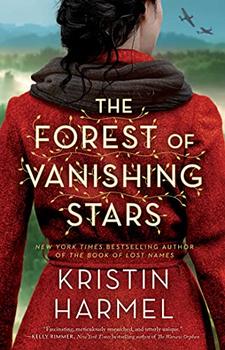Summary | Excerpt | Reading Guide | Reviews | Beyond the Book | Readalikes | Genres & Themes | Author Bio

A Novel
by Kristin Harmel
The Jüttners' maid, the timid daughter of a dead sailor, had gone home two hours before, and it was a few minutes past ten o'clock when the Jüttners finally turned off their lights. Jerusza exhaled. Darkness was her shield; it always had been. She squinted at the closed windows and could just make out the shape of the little girl's infant bed in the room to the right, beyond pale custard curtains. She knew exactly where it was, had been into the room many times when the family wasn't there. She had run her fingers along the pine rails, had felt the power splintering from the curves. Wood had memory, of course, and the first time Jerusza had touched the bed where the baby slept, she had been nearly overcome by a warm, white wash of light.
It was the same light that had brought her here from the forest two years earlier. She had first seen it in June 1920, shining above the treetops like a personal aurora borealis, beckoning her north. She hated the city, abhorred being in a place built by man rather than God, but she knew she had no choice. Her feet had carried her straight to Behaimstrasse 72, to bear witness as the raven-haired Frau Jüttner nursed the baby for the first time. Jerusza had seen the baby glowing, even then, a light in the darkness no one knew was coming.
She didn't want a child; she never had. Perhaps that was why it had taken her so long to act. But nature makes no mistakes, and now, as the sky filled with a cloud of silent blackbirds over the twinkling city, she knew the time had come.
It was easy to climb up the ladder of the modern building's fire escape, easier still to push open the Jüttners' unlatched window and slip quietly inside. The child was awake, silently watching, her extraordinary eyes—one twilight blue and one forest green—glimmering in the darkness. Her hair was black as night, her lips the startling red of corn poppies. "Ikh bin gekimen dir tzu nemen," Jerusza whispered in Yiddish, a language the girl would not yet know. I have come for you. She was startled to realize that her heart was racing.
She didn't expect a reply, but the child's lips parted, and she reached out her left hand, palm upturned, the dove-shaped birthmark shimmering in the darkness. She said something soft, something that a lesser person would have dismissed as the meaningless babble of a little girl, but to Jerusza, it was unmistakable. "Dus zent ir," said the girl in Yiddish. It is you.
"Yo, dus bin ikh," Jerusza agreed. And with that, she picked up the baby, who didn't cry out, and, tucking her close against the brittle curves of her body, climbed out the window and shimmied down the iron rail, her feet hitting the sidewalk without a sound.
From the folds of Jerusza's cloak, the baby watched soundlessly, her mismatched ocean eyes round, as Berlin vanished behind them and the forest to the north swallowed them whole.
CHAPTER TWO
1928
The girl from Berlin was eight years old when Jerusza first taught her how to kill a man.
Of course Jerusza had discarded the child's given name as soon as they'd reached the crisp edge of the woods six years earlier. Inge meant "the daughter of a heroic father," and that was a lie. The child had no parent now but the forest itself.
Furthermore, Jerusza had known, from the moment she first saw the light over Berlin, that the child was to be called Yona, which meant "dove" in Hebrew. She had known it even before she saw the girl's birthmark, which hadn't faded with time but had grown stronger, darker, a sign that this child was special, that she was fated for something great.
The right name was vital, and the old woman couldn't call Yona anything other than what she was. She expected the same in return, of course, a respect for one's true identity. Jerusza meant "owned inheritance"—a reference to the magic she had received from her own bloodline, and a tribute to being owned by the forest itself—and it was the only thing she allowed Yona to call her. "Mother" meant something different, something that Jerusza never would be, never wanted to be.
Excerpted from The Forest of Vanishing Stars by Kristin Harmel. Copyright © 2021 by Kristin Harmel. Excerpted by permission of Gallery Books. All rights reserved. No part of this excerpt may be reproduced or reprinted without permission in writing from the publisher.
I have lost all sense of home, having moved about so much. It means to me now only that place where the books are ...
Click Here to find out who said this, as well as discovering other famous literary quotes!
Your guide toexceptional books
BookBrowse seeks out and recommends the best in contemporary fiction and nonfiction—books that not only engage and entertain but also deepen our understanding of ourselves and the world around us.